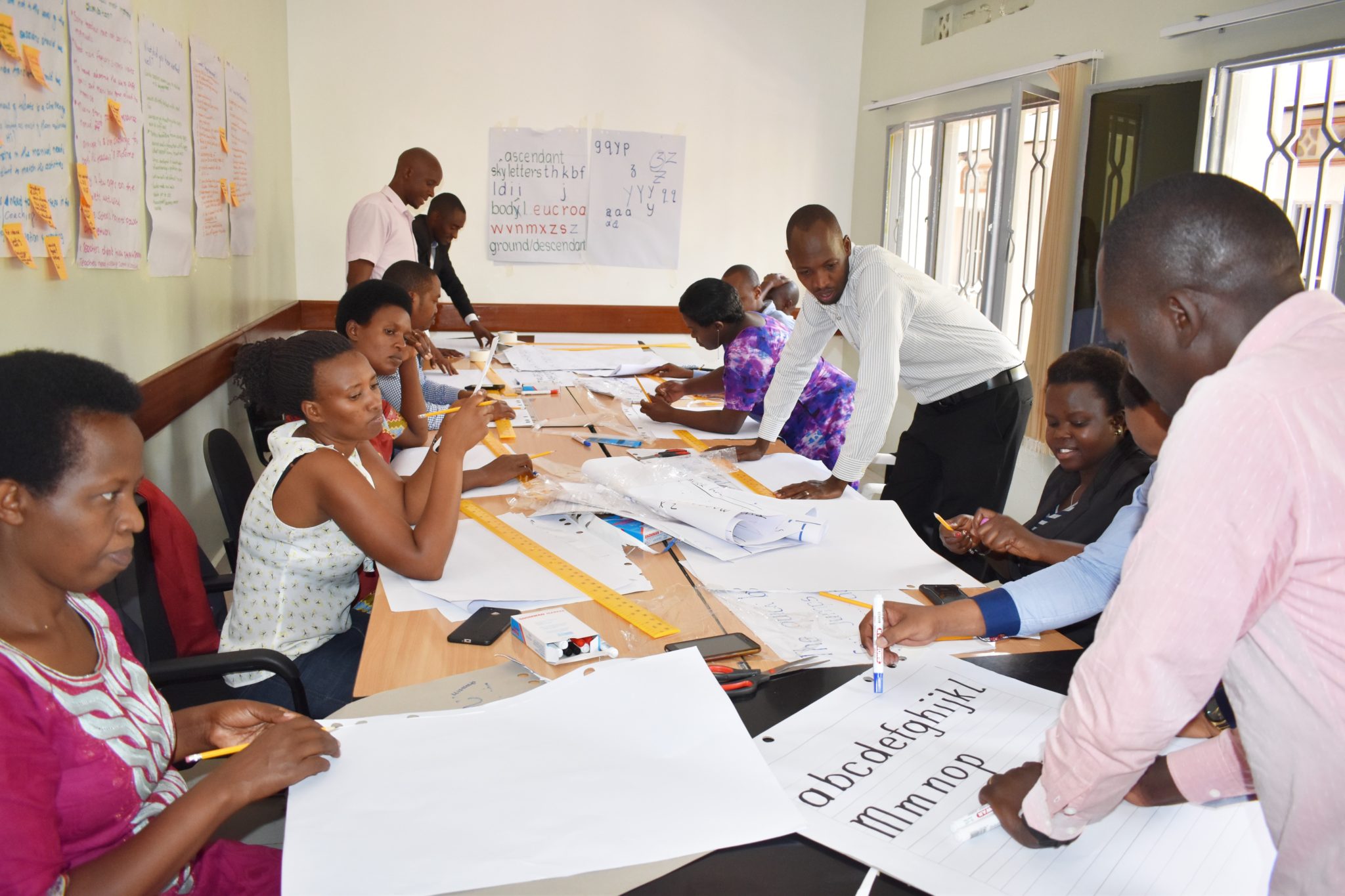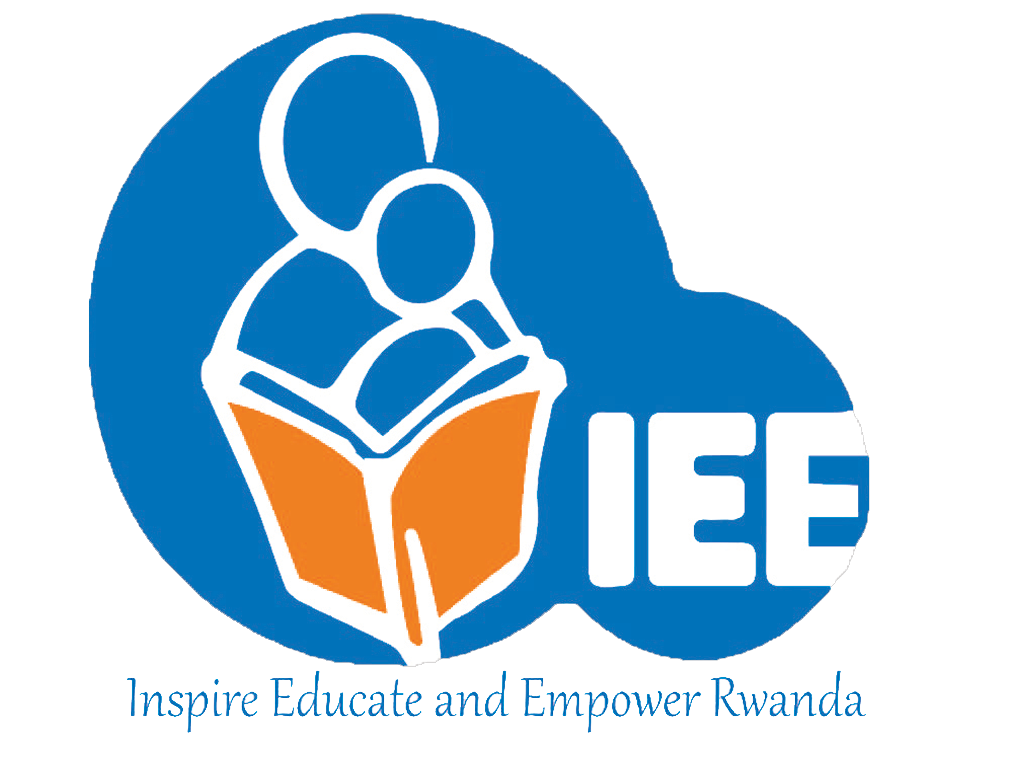IEE’s AREA OF INTERVENTION
IEE supports the efforts of the ministry of education through Rwanda Education Board to create and produce lifelong learning skills in children through providing them with quality education.

Teacher development training and Technical assistance:
IEE supports the ministry of education’s efforts to implement Teacher development training and technical assistance for enhanced quality teaching and learning through Continuous Professional Development Programs across all 30 districts in Rwanda.

Learning and Teaching:
IEE’s School Based Teacher Training and learning is direct and personalized professional development in English for communication and teaching and learner-centered teaching pedagogies that takes place in the school and responds to school culture and conditions.

Curriculum and Learning/Teaching material creation and development
Based on the experience of IEE and staff in mentoring and training teachers that stretches from 2010 to date, IEE has also been developing curriculum and training materials with Education partners, these training and learning materials are used at school levels and other areas.

School-based Mentorship and trainings
In partnership with UNICEF, IEE Rwanda supports Rwanda Education Board (REB) in capacity building for Mentor Trainers and School-based Mentors.

Monitoring and Evaluation
It is work not done when monitoring and evaluation is not up to date. It is the work of the Program Managers (PMs) at IEE to move to the districts and schools of intervention to do a follow up of the activities as carried out by IEE mentors and other technical staff members.
Teacher development training and Technical assistance

IEE supports the ministry of education’s efforts to implement Teacher development training and technical assistance for enhanced quality teaching and learning through Continuous Professional Development Programs across all 30 districts in Rwanda.
The Ministry of education in collaboration with UNICEF in partnership with Inspire Educate and Empower Rwanda are implementing Teacher development training and technical assistance programs for enhanced quality teaching and learning through Continuous Professional Development Programs across all 30 districts in Rwanda.
The IEE staff in the district is known as a Continuous Professional Development Advisor (CPDA) and his/her main responsibilities include:
- Building public relations with all education partners and stakeholders in the district
- Organizing and conducting monthly CPD activities in the district.
- Participation in JADF activities in the district (open days, general assemblies, cluster meetings, retreats, mobilization campaigns, Monitoring and evaluation.
- Provide technical support in English as a medium of instruction, Pedagogical approach, Understanding CBC policy and its implementation,
- Lesson preparation observation, co-teaching, modelling and constructive feedback, creating awareness among the stakeholders.
- NB: IEE staff in the district is provided with CPD manuals that has the content used in the trainings.
Learning and Teaching

IEE’s School Based Teacher Training and learning is direct and personalized professional development in English for communication and teaching and learner-centered teaching pedagogies that takes place in the school and responds to school culture and conditions. Focused, individual support provides concentrated language and pedagogical development and nurtures leadership in schools.
This programme is being implemented by 10 Mentor Trainers supporting School-Based Mentors in 50 schools. Around these 50 schools, IEE Rwanda is mobilizing parents and community members to support transition of children from ECDs into regular schools.
The IEE Rwanda Mentor Trainers work alongside parents’ committees and school management to mobilize and build capacities of parents and community members in support of teaching and learning to support transition from community-based early learning to regular schools.
Mentor Trainers also through School-based Mentorship, support teachers to have increased capacity to deliver quality education. Mentor Trainers provide technical capacity support to teachers at 50 schools to improve their pedagogical approaches and English-language, in an overall effort to increase the quality of education.
Primarily, support is given to the school-based mentor who has a role to facilitate trainings and capacity development amongst their respective colleagues. Subsequently, IEE Rwanda technical experts support the School-Based Mentors to coordinate and build capacity of their respective colleagues.
A child’s caregivers in the role of first teachers assist and support the child’s cognitive, emotional, physical, and social development. A caregiver may be a child’s parent, grandparent, child care provider, early childhood teacher, and/or other significant family members.
It is important for parents, supporting caregivers, and educators of young children to understand this familial role. To those who are working at the centers, the work include, but is not limited to: preschool workforce; evidence-based curriculum; early learning standards; effective transitions; screening and assessment; culturally, linguistically, and age appropriate practices; enhancing teacher-child interactions; supporting infant/toddler practices.
Curriculum and Learning/Teaching material creation and development

Based on the experience of IEE and staff in mentoring and training teachers that stretches from 2010 to date, IEE has also been developing curriculum and training materials with Education partners, these training and learning materials are used at school levels and other areas.
In collaboration with UNICEF, Inspire, Educate and Empower (IEE) have complemented Ministry of Education (MINEDUC), Rwanda Education Board (REB) efforts in education. Among several achievements, IEE has supported revision of the basic education curriculum from being knowledge-based to being competency-based. Again, IEE believes in the provision of and or creation of or improvisation of teaching and training/learning aids (low/no cost teaching materials) to enable the delivery of the Competency-based Curriculum (CBC).
UNICEF/IEE contributed to this fundamental shift in delivery of education by supporting trainings for education stakeholders and for teachers to equip them with knowledge and skills to effectively deliver the Competency-based Curriculum (CBC).
These activities took place in tandem with contributing to in-service teacher development through a UNICEF/IEE-supported school-based mentorship model program, which has informed restructuring of the national School-based Mentorship Program (SBMP).
School-based Mentorship and trainings

In partnership with UNICEF, IEE Rwanda supports Rwanda Education Board (REB) in capacity building for Mentor Trainers and School-based Mentors.
IEE knows that no one understands the challenges teachers face in the classroom better than other teachers—which is why collaboration is a crucial part of teacher professional development. IEE therefore stands tall against all the odds to earn the praise of supporting teachers to this extent through peer lesson observation, mentorship and offering constructive feedback among teachers and school based mentors.
In partnership with UNICEF, REB and MINEDUC, IEE posted 10 School based mentor trainers to districts where every one of them supports teachers in 5 schools and an ECD/F. Now the current Teacher Development program is in practice in fifty (50) schools and ten (10) Early childhood development and family centers (ECD/F) in 9 districts of Rwanda viz- Ngoma, Rwamagana, Gasabo, Nyarugenge, Ruhango, Ngororero, Nyabihu, Gakenke and Gicumbi districts from which we get 17 Sectors.
IEE mentor trainers in this Program address the following
- Effective use of English as classroom language of Instruction.
- Planning lessons in line with Competence Based curriculum (CBC) requirement.
- Assessment strategies.
- Enhancing School based in service training (SBIs)
- Supporting Caregivers in understanding effective ways of handling learners at ECE/ECD levels.
- In coordination with ECD Coordinators IEE Mentors visit and support Home based Caregivers
- Supporting the transition of children from ECD centers into regular schools.
- Organizing School General Assembly Committee Workshops (SGAC).
Monitoring and Evaluation

It is work not done when monitoring and evaluation is not up to date. It is the work of the Program Managers (PMs) at IEE to move to the districts and schools of intervention to do a follow up of the activities as carried out by IEE mentors and other technical staff members.
There is a work plan that is developed at the office and is to be followed by all the concerned trainers/mentors. While at their schools, the program managers follow the plan of activity for that particular week though can adopt to justified changes made by the mentor.
PM’s work in the schools is to offer support, help in relationship building, carrying out enquiries with teachers and school administrators and more so other stakeholders on the progress of the program.
There several ways of getting information by the Program managers thus: interviews with school administration and teachers, parents and the mentor, pictorial coverage sent through the tablets that mentors use, workshop reports and direct observation of activities by the visiting Program Manager. All these will culminate into report making.
